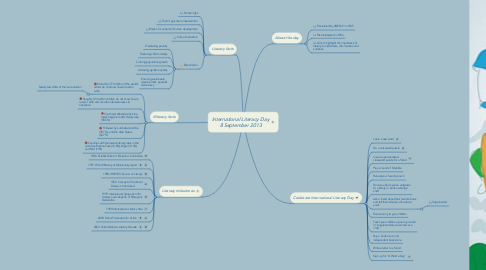International Literacy Day 8 September 2013
por Raphaela Brandner


1. Literacy facts
1.1. Human right
1.2. Tool of personal empowerment
1.3. Means for social and human development
1.4. Core of education
1.5. Essential for
1.5.1. Eradicating poverty
1.5.2. Reducing child mortality
1.5.3. Curbing population growth
1.5.4. Achieving gender equality
1.5.5. Ensuring sustainable development, peace & democracy
2. Literacy milestones
2.1. 1946: Establishment of Education Committee
2.2. 1957: World Illiteracy at Mid-century report
2.3. 1958: UNESCO Courier on literacy
2.4. 1965: Concept of functional literacy is introduced
2.5. 1975: International Symposium for Literacy and adoption of Persepolis Declaration
2.6. 1990: International Literacy Year
2.7. 2000: Dakar Framework for Action
2.8. 2003: United Nations Literacy Decade
3. Illiteracy facts
3.1. More than 774 million of the world's adults do not know how to read or write
3.1.1. Nearly two-thirds of them are women
3.2. Roughly 123 million children do not know how to read or write and are often denied access to education
3.3. South and West Asia has the lowest regional adult literacy rate (58.6%)
3.4. Followed by sub-Saharan Africa (59.7%), and the Arab States (62.7%)
3.5. Countries with the lowest literacy rates in the world are Burkina Faso (12.8%), Niger (14.4%) and Mali (19%)
4. About the day
4.1. Proclaimed by UNESCO in 1965
4.2. First celebrated in 1966
4.3. Aims to highlight the importance of literacy to individuals, communities and societies
5. Celebrate International Literacy Day
5.1. Learn a new word
5.2. Do a crossword puzzle
5.3. Create a personalized crossword puzzle for a friend
5.4. Play a round of Scrabble
5.5. Reread your favorite poem
5.6. Donate a book you've outgrown to a library or book exchange shelf
5.7. Ask a friend about their favorite book and tell them what you like about yours
5.7.1. Swap books!
